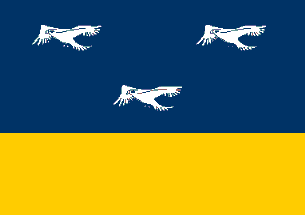 image by Joseph McMillan
image by Joseph McMillan
Last modified: 2022-03-05 by ian macdonald
Keywords: parana | arapongas | birds: 3 | bird (white) |
Links: FOTW homepage |
search |
disclaimer and copyright |
write us |
mirrors
The municipality of Arapongas (124,810 inhabitants in 2020; 38,222 ha) is
located 400 km north-west of Curitiba.
Arapongas was established in 1935
by William da Fonseca Brabason Davids, director of the Companhia de Terras
Norte do Paraná, at the time Mayor of Londrina. On 28 September 1935, the
French merchant René Cellot and his daughter Geanine inaugurated the first
commercial estate; the same year, the Brazilian farmer Florinao Freire acquired
the first agricultural plot.
The municipality of Arapongas was established
by State Law No. 2 promulgated on 10 October 1947, separating from Rolândia.
https://www.arapongas.pr.gov.br/
Municipal website
The flag and arms of Arapongas are prescribed by
Municipal Law No. 3,193 promulgated on 26 April 2005.
Article 5.
1.
Basic dimensions.
The municipal flag shall have the official dimensions
prescribed for the national flag. It shall be formed of a rectangular panel in
width 70% of its length. The rectangle shall be divided in two longitudinal
parts, without any visible dividing line. The lower part shall match 27% of the
length and the upper part shall match 43% of the length.
2. Elements.
In the upper part shall be placed three figures symbolizing araponga bird,
inscribed in an imaginary rectangle, in length 22.75% of the flag's total
length, in width, 9.75% of the flag's total length.
To insert these
elements, the flag's upper part shall be divided in two imaginary vertical
parts and another three imaginary horizontal parts, of the same size, forming
identical cells. The placement of the figures shall be symmetrical in relation
with the imaginary vertical axis, one of them matching the axis and the other
ones, above the first, in opposed sides.
The central figure is placed with
its upper side tangent to the imaginary horizontal line, with its center
matching the flag's imaginary vertical axis.
The two lateral figures have
their axis matching the imaginary upper horizontal line, distant of 1/6 of the
flag's total length from the imaginary vertical axis.
3. Colors
The
upper part shall be deep blue, symbolizing the sky, while the lower part shall
be golden yellow, symbolizing the soil resources. The three birds are white.
Article 17.
The coat of arms of the municipality of Arapongas is
described as follows: "Modern shield gules tierced per bend surmounted by a
four-towered mural crown or proper to municipalities, supporters, motto."
The components are described as follows: "Gules a bend azure charged with three
arapongas (Chasmorhynchus nudicolis) argent surrounded by a
fleur-de-lis or and a lion rampant of the same. A bordure argent five Brazilian
pines (Araucaria brasiliana) proper. The shield supported by stylized
coffee branches fructed and yerba mate plants all proper. A scroll argent
inscribed in letters azure 'ARAPONGAS' and 'DATA DA EMANCIPAÇÃO POLÍTICA' -
'10-10-1947'."
https://leismunicipais.com.br/a/pr/a/arapongas/lei-ordinaria/2005/320/3193/lei-ordinaria-n-3193-2005-dispoe-sobre-a-forma-e-a-apresentacao-dos-simbolos-do-municipio-de-arapongas-revoga-a-lei-n-493-de-19-de-novembro-de-1963-e-da-outras-providencias
Leis Municipais database
The very same description of the coat of
arms was supplied by Municipal Law No. 493 promulgated on 15 November 1963.
https://leismunicipais.com.br/a/pr/a/arapongas/lei-ordinaria/1963/49/493/lei-ordinaria-n-493-1963-estabelece-o-brasao-de-armas-de-arapongas-e-da-outras-providencias
Leis Municipais database
Photos
https://www.arapongas.pr.gov.br/7664_noticia_bandeiras-sao-instaladas-no-entroncamento-das-ruas-pavao-e-guaratinga
https://www.arapongas.pr.gov.br/6667_noticia_arapongas-inicia-comemoraeccedileotildees-da-independeecircncia-do-brasil
https://tnonline.uol.com.br/noticias/arapongas/servidores-de-arapongas-terao-que-esclarecer-sobre-auxilio-emergencial-463441?d=1
https://www.facebook.com/PrefeituradeArapongas/photos/3182074348677449
https://www.facebook.com/PrefeituradeArapongas/photos/2836813466536874
The araponga (bare-throated bullbird) is known today as Procnias
nudicollis (Vieillot, 1817).
Procnias nudicollis occurs in a
wide area of east Brazil, from Sergipe and Bahia in the north, south to Rio
Grande do Sul and inland to south Mato Grosso, north-east Argentina (Misiones,
with one record in Corrientes) and east Paraguay. In Paraguay, the species is
primarily found in the northern part of Eastern Paraguay, in Atlantic Forest in
Canindeyú and San Pedro departments, with a few birds also recorded in gallery
forest in the Cerrado of Concepcion department. The species is considered
extinct from remnant forest patches of north-eastern Brazil north of the São
Francisco river, where it was formerly known from the Murici area.
This
species is suspected to be undergoing a moderately rapid decline owing to
ongoing deforestation and trapping. For this reason, it is listed as Near
Threatened.
https://www.iucnredlist.org/species/22700968/177705453
IUCN Red List
Araucaria brasiliana A. Rich. is an obsolete synonym of _Araucaria
angustifolia_ (Bertol.) Kuntze.
Ivan Sache, 31 January 2022